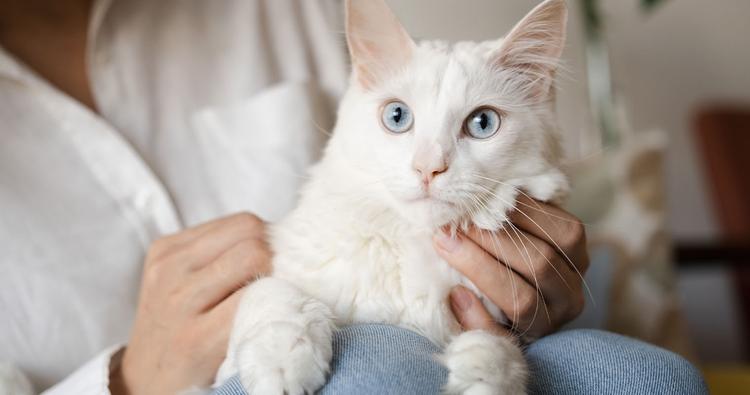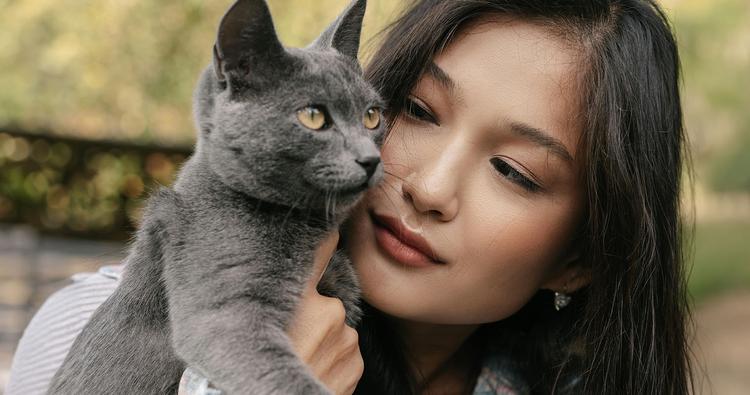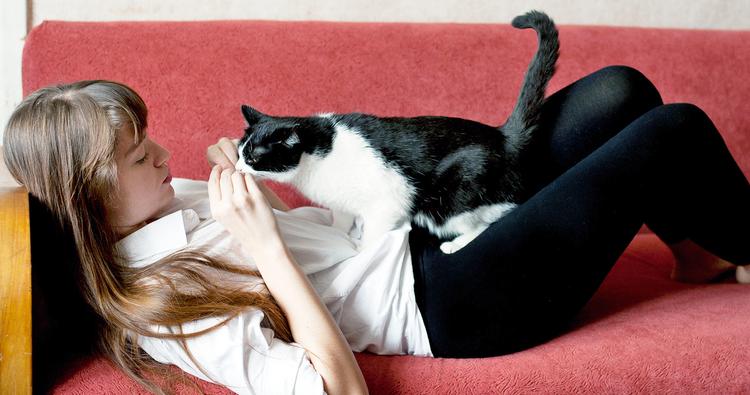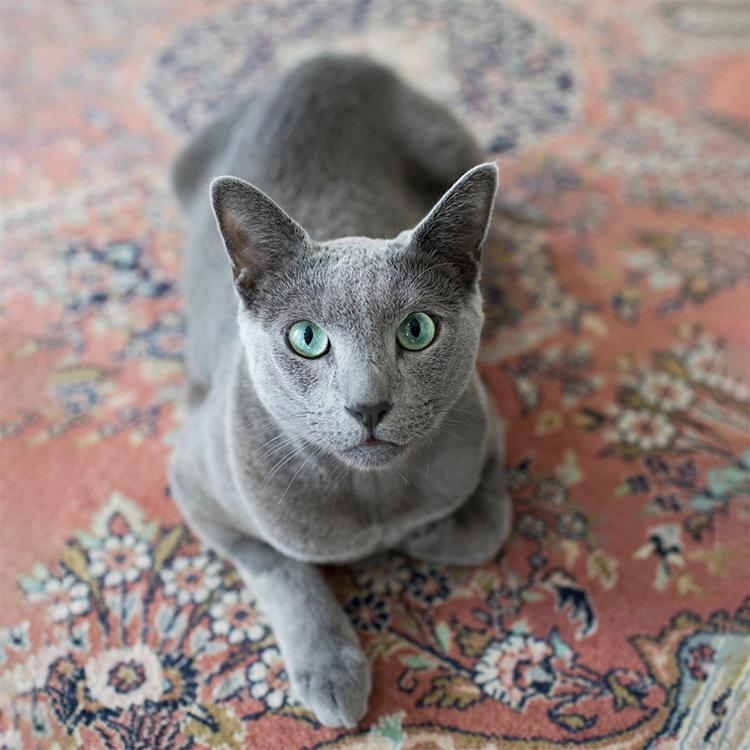by Adopt a Pet, | May 3, 2024

Maksim Goncharenok / Pexels
Black cats are hardly the spooky creatures Halloween lore makes them out to be. Black cats, often overlooked and unfairly stigmatized, face a unique challenge leading to lower adoption rates. But let’s set the record straight: a cat’s personality and behavior are not determined by the hue of their fur. Black cats are just as talkative, affectionate, curious, and loyal as their multicolored counterparts — not to mention gorgeous. Here’s a list of some of the most popular breeds known for their dark coats and bright dispositions.
By choosing to adopt a black cat from an animal shelter or rescue, you’re not only welcoming an amazing companion into your life, but you’re also defying outdated superstitions and giving these wonderful cats the forever homes they deserve.
10 Beautiful black cat breeds
Black cats come in a variety of coat styles from short to long, and even nearly hairless.

Hasret Sonmez / iStock
1. British Shorthair
Once a traditional British domestic cat, the British Shorthair has been bred up to pedigree status. Different in shape and standard color to American domestic cats, they’re known for having a dense coat and a stocky build that makes them tempting for a hug. However, they prefer expressing their affection by sitting in silent contemplation beside you and are not necessarily great lap cats. They can be different colors, including black, but are most popularly "British Blue," or a deep silver-gray, and have dark yellow eyes.

JulieK2 / Shutterstock
2. Chantilly-Tiffany
The Chantilly-Tiffany, a long-haired domestic cat from North America, is a breed often mistaken for an ordinary house cat but is actually quite rare; the breed was believed to be extinct until 1960. They’re on the small side and can come in all sorts of colors, but originally were known for being a rich dark chocolate brown, which is nearly black. They have striking gold eyes that darken over time and wide-set ears. Chantilly-Tiffanys need regular grooming, including brushing every other day — otherwise, they might pull at their fur too much, creating bald spots.

Viktor Sergeevich / Shutterstock
3. Bombay
The beautiful sable Bombay cat is a mix of an American Shorthair with a Burmese, often likened to a panther in appearance. They will be at your feet most of the time; they are very loving toward people. Bombays are very smart and are sometimes called "dominant" cats; they are social with other animals, but they also like being the leader of their pack. Unlike regular house cats, Bombays always have short black coats, black toe pads, noses that accentuate their copper-colored eyes, and muscular, compact features.

Sheli Jensen / Shutterstock
4. Devon Rex
The curly-haired Devon Rex has a distinctive appearance and comes in many colors, including solid black. They have cute, triangle-shaped faces, massive ears, and large round eyes. They shed minimally and are more hypoallergenic than most cats but require regular bathing to help with oil buildup in their fur.

Jiji / AdobeStock
5. Maine Coon
As its name indicates, the Maine Coon is from the state of Maine. The smokey black cat breed is one of the oldest natural breeds in North America and the biggest. Maine Coon cats require a lot of exercise, play, and attention. They also grow long, thick coats that need regular brushing. While they are fairly high-maintenance cats, they’re also amazingly intelligent and friendly. If you want a dog-like companion in the body of a massive feline, this is the breed for you. It’s also a good idea to ensure they have another kitty friend around; they are happiest when they have a companion.

Monica Turlui / Pexel
6. Manx Cat
Similar to the Bobtail, the Manx has a naturally occurring gene that shortens their tails to near non-existence. The breed originated on the Isle of Man but is now popular everywhere. Manx cats have powerful hindquarters and are great hunters, but also love to cuddle. This black cat breed can live a long time, but their gene mutation can also cause spinal disorders, so be sure to keep up their regular vet checkups.

Elisa Putti / Shutterstock
7. Norwegian Forest Cat
Originating in Northern Europe, the Norwegian Forest cat is happiest in cold climates thanks to their thick wooly undercoats and water-repelling top coats — coats that need a lot of brushing. These black cats are friendly and sociable but also have an independent streak. They don’t love being picked up and will make themselves scarce if they feel overwhelmed, especially around kids.

Jolanta Jd / Shutterstock
8. Havana Brown
Havana Brown cats are descendants of Siamese cats bred with domestic black cats and Russian Blues. They’re so rare that some consider them to be essentially extinct. But those still around are described as very even-tempered and fairly quiet, communicating in chirps rather than loud meows. They usually have short, sable coats and pointed faces with large ears.

Casey Elise Christopher / Shutterstock
9. American Shorthair
The main difference between the American Shorthair and a Domestic Shorthair cat is pedigree. Both are descended from European cats who came to the U.S. during colonization on the ships of early settlers. These cats tend to have round, full faces, and shorter ears. They come in all different colors, although black is one of the most common.

Solomiia Korchynska /Shutterstock
10. Oriental Shorthair
Oriental Shorthairs have a very short coat, long, lithe limbs, and a large protruding nose. They also have large ears that are sometimes irregularly shaped and can look like little wings on the sides of their heads. This black cat breed requires very little brushing but they like to be fussed over. They have a certain dignity to their demeanor and interesting vocalizations.
Commonly asked questions
Are black cats rare?
Nope! Black cats are not rare; cats of many breeds can sport all-black coats. Black is a recognized color variant or common coat color for over 20 cat breeds, such as:
There are many other breeds where black may be a common color variation, even if it is not officially recognized as a breed standard. And many cats are also bi- or tri-color, or have black patterns and markings.
Are black cats healthy?
Black cats are healthier overall than most cats. Researchers at the National Institute of Health noted that the gene that causes them to have a black coat also protects against some diseases, such as FIV. They also have the evolutionary advantage of being better at camouflaging themselves and, therefore, less susceptible to predators.
What is black cat syndrome?
Anecdotally, vets and shelter workers have said that black cats and black dogs get passed up for adoption over other colors of animals — this phenomenon is known as black pet syndrome. Some suggest it might be internal bias or lingering worries over the mythic unluckiness of black animals. Or it could be that they don’t photograph as well for potential adoption listings. That said, this means adopters will likely have their pick of wonderful animals in beautiful jet black.
Are black cats bad luck?
No, black cats are not bad luck. Black cats used to be associated with bad luck, witchcraft, and some stories of bad omens, but we’ve moved beyond that. The long-held superstition that a black cat crossing your path is bad luck is completely baseless, as any black cat parent can tell you. The only thing you should do when a black cat crosses your path is give it a wave hello.
On the contrary, British sailors used to consider having a black cat on board a good omen. They believed that having one of these sleek feline creatures around would bring them good luck and ensure a safe journey.
Where can I adopt a black cat?
Many black cats are available for adoption at local shelters and rescue groups across the United States. Start your search for a friendly black cat at adoptapet.com
References
Molecular Genetics and Evolution
Black cats may be the more fortunate felines
Spots, stripes and blotches: Color patterns of cat fur tracked to a key gene
Don’t be so fast to judge a cat by its color, study warns
Cat Color May Hint How Aggressive It Is: Felines With Black, White Or Gray Fur Make Best Pets
More about cat breeds
And if you’re looking for a spooky-inspired name for your bestie, these black pet names will surely inspire. If you’re not finding the cat for you, consider these adorable cat breeds, fluffy cat breeds, and super-sized cat breeds.

Adopt a Pet
Related articles

Breed Info
10 White Cat Breeds That Will Melt Your Heart

Breed Info
11 Gray Cat Breeds That Are the Definition of Sleek

Behavior & Training
How Do I Stop My Cat From Running Outside?

Behavior & Training
Are Cats Hard To Train?

Behavior & Training
Why Do My Cats Hate Each Other?

Adoption Advice
8 Signs You’re Ready to Get a Cat
Adopting a kitty is a major commitment, but it doesn’t have to be a scary one. Here’s how to know when you’re ready to be the best pet parent ever.



Adoption Advice
Best Gray Cat Names for Your Kitty
Adopting a gray-colored kitty? Get inspired with this list of gray-themed cat names and find the perfect fit for your cat.


Behavior & Training
How to Get a Cat to Like You (and Eventually Love You)
Is your new cat giving you the cold shoulder? Here’s how to get them to warm up.

Behavior & Training
How Can I Stop a Cat From Spraying?
Is your cat spraying? Read more to learn the why cats spray and effective methods to stop this behavior.